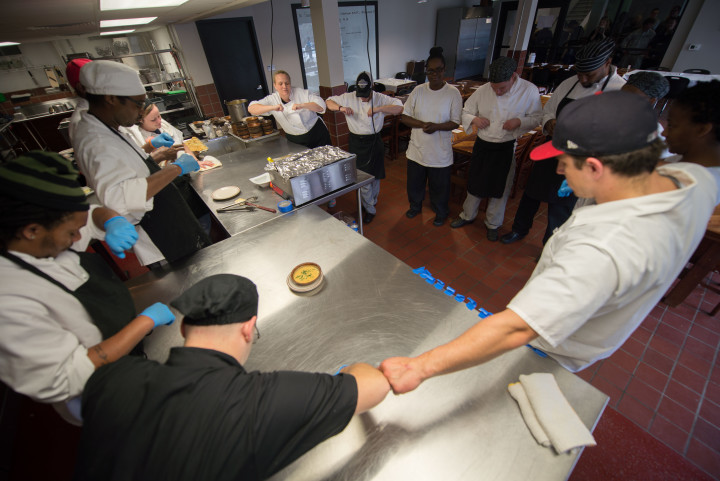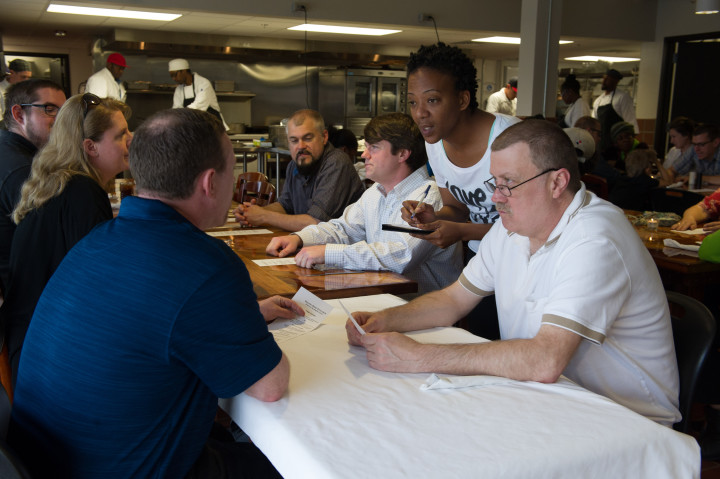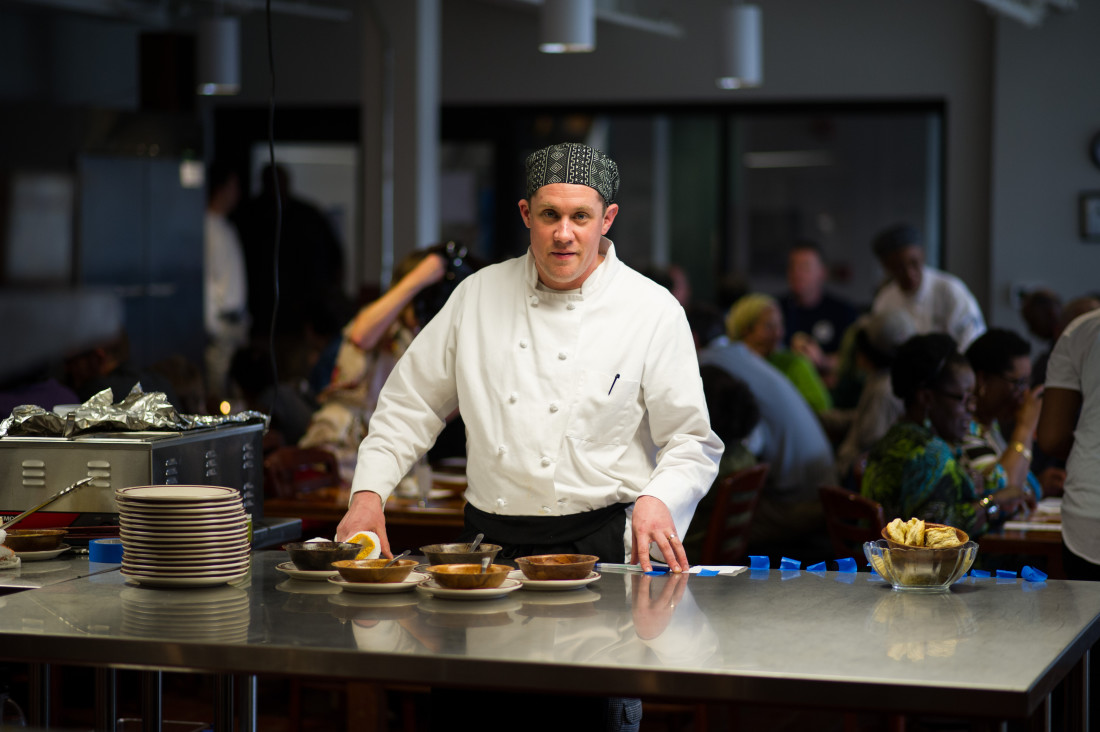“All right, guys, let’s circle up!” barks chef Liam Luttrell-Rowland. “Let’s pray, and then let’s get to work.” White chef’s coats pop out from around every corner, circling the expo counter as his crew’s heads are bowed.
During the past few weeks, these cooks have gotten used to serving three-course meals to whoever shows up. But there are no point-of-sale systems, uniformed waitresses or fancy, laminated menus here, because this isn’t your average restaurant: It’s the Southside Community Kitchen on Livingston Street, the café for Green Opportunities’ Kitchen Ready program. Weekday lunches and a Thursday night dinner are offered free to public housing residents; members of the broader community are welcome but are asked for a donation. The nonprofit, three-month cooking school trains public housing residents, recovering addicts and ex-convicts, in collaboration with A-B Tech’s culinary department, Asheville Independent Restaurants, MANNA FoodBank, the Asheville Housing Authority and the city school system.
Tonight’s a special night, though: Luttrell-Rowland and his team are serving up a more complex array of flavors in two seatings, each accommodating about 50 people.
“As a chef,” he explains, “I’m given a $90-a-day food cost. I’m able to serve about 100 people on that, including food we’re given by MANNA FoodBank.” And that low cost is even more amazing considering the quality coming out of this kitchen.

The crowds filter in, are seated by the host and given menus, with two options for each course. The servers — some volunteers, some students — take the orders.
I choose the onion-and-leek soup with braised oxtail. It’s creamy and rich: The meat’s dark drippings inscribe a hurricane shape in the white soup, with bursts of green chives dotting the perimeter. My date goes for the smoked turkey Cobb salad with roasted red pepper, egg, romaine lettuce and an avocado ranch dressing.
Launched in 2011, the Kitchen Ready program was the brainchild of Bouchon owner Michel Baudouin, in coordination with chef Mark Rosenstein, one of the fathers of the local restaurant scene. The idea was to develop a workforce of skilled, highly trained cooks from within a segment of Asheville that’s often overlooked, undervalued, marginalized and downright ignored, as a way to provide well-paying jobs with benefits.
“This part of Asheville is actually a food desert — a place where people can’t get access to enough healthy food to survive,” Luttrell-Rowland explains. You may remember him from his days as chef at The Magnetic Field or perhaps from his time as pastry chef at The Admiral. But one thing’s for sure: If you’ve ever had his food, you remember it.
When the second course rolls around, my date picks the grilled salmon, plopped atop red lentils and fennel slaw with sticky rice and turkey bacon. I dig my fork into roasted chicken thighs with currants and curry on a bed of saffron rice. The yellow rice floats in a white parsnip puree, and a jerk butternut-and-carrot salad tents the tender cuts of dark meat.
In a blind tasting, I would never believe this meal had been prepared by students, most of whom first donned a chef’s coat only a few months ago. But despite the impressive skills on display, there’s no guarantee of employment once they complete the program. Green Opportunities goes the extra mile to match graduates with jobs, says Luttrell-Rowland, but as the program continues to build its reputation, only about 40 to 50 percent of them are finding work. And for those who do, holding onto those jobs is often difficult, no matter how skilled and hardworking they are.
“Our city still deals with a lot of segregation,” he explains. “Even if it’s not racial segregation, it’s economic. If you look at someone who has reliable transportation, comes from a middle-class background and is Caucasian, if they party too hard one night and call in the next day, their employer might cut them some slack. Our graduate might not show up one day without notice, and the next day they’re gone. It takes a lot of education for the employers, because we’re not asking anyone to lower the bar, but there are some communication issues that have to be worked out. Employers have to start learning how to actually receive GO graduates, and want to work with our organization to help mentor them.”
Still, watching these cooks move, you wouldn’t believe this was their first year in a kitchen. They dance gracefully behind the counters, moving swiftly and efficiently and calling their locations to avoid bumping into one another. Not all of them are restaurant virgins, however.
“I’ve been working at Bojangles’ for six years. It’s a dead end,” says Domane Hines, one of the 14 students enrolled in the current session. And while he may never have worked a sauté station at Bojangles’, he’s clearly picked up the rhythm of a kitchen, that delicate economy of movement that’s impossible to teach in any class. His work behind the stove is calm, calculated and intentional.

“Systematically, in this neighborhood and in any neighborhood that is living in poverty, there’s a degradation of people’s confidence, because they can’t feel comfortable to walk into any environment and just apply for a job,” says Luttrell-Rowland. “And that’s one of the things that I’m trying to break down. I want to open up that dialogue and figure out how to get people to a place where they’re comfortable making a résumé, showing up for an interview and pitching themselves. You see a lot of people coming into Kitchen Ready that have a ton of fast-food experience, and they’re incredibly skilled and fast: They know what to do and have great intuition in a kitchen. But there’s some sort of mental block that keeps them from vying for a position at Bouchon or another local restaurant. What we can do for the future is get people the skills so they can be confident in themselves and put themselves out there. And even if it’s not a home run every time, at least they’re going to get on base, which is what I care about.”
By the time dessert is served, our bellies are stuffed. But then a generous helping of lemon curd parfait with crisp cookies and strawberry preserves arrives, and no one’s about to turn it down.
“One thing that we’re thinking of a lot, which really makes Kitchen Ready unique, is that this is an entry-level program,” Luttrell-Rowland explains. “What we’re doing is training to build the workforce — the enormous number of just really solid cooks that restaurants need. Eventually, yes, we want them to grow to become chefs. But my job, in their three months, is to give them the foundations of good cooking.”
And make no mistake, this is damned good cooking.
The Kitchen Ready program serves lunch (Monday through Friday, noon to 2 p.m.) and dinner (Thursdays, 5:30 and 7 p.m. seatings for up to 50 people) downstairs in the Arthur R. Edington Education and Career Center (133 Livingston St., Asheville). Meals are free for public housing residents, available to others for a donation. Tip donations are given directly to the students. For details or to apply for courses, visit greenopportunities.org/what-we-do-/go-kitchen-ready/.



Liam, We are all proud of what you are doing . Best of luck and keep up the good fight. You are making a real difference for the good. Give yourself a pat on the back. Proud to have you in our family.
After reading the poignant observant words of the chef on the entrenched obstacles in Asheville in getting job placements with local employers, I noticed a silence. A deafening silence. A silence from the board members and staff leadership of Green Opportunities on the same topic. If they don’t have the ability of their own chef to talk publicly about it, how do we know they have a clue about the problem? A grasp? Let alone a plan? I dont think any board member or staff leaders have ever even admitted to Mountain Xpress in this years or last years many articles on Green opportunities that there is a problem in this area that they can see. Nor can the evidence of them having a grasp be found in GO’s own press releases. So why does their chef have to carry the solo burden of dealing with this? Where are the pictures and the names of the board leaders who are suppose to acknowledging this and dealing with this? Isn’t that really what true leadership is? The chef is just an instructor, where is the voice of the temporary executive director? It seems they want to do the feel-good talk only. If so, that is not leadership. That’s just ducking the problem and being more ineffective.